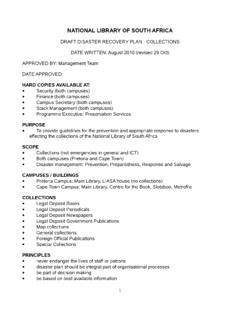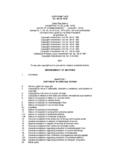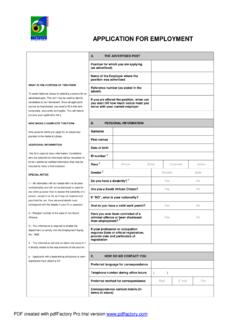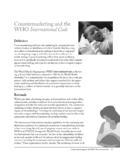Transcription of Preserving and Celebrating our literary heritage
1 Preserving and Celebrating our literary heritagePreserving and Celebrating our literary heritagePage 2 Table of Contents Foreword 5 Message from the National Librarian 7 IsiNdebele 9 Isilodlhelo sakaNzunza noManala 9 Iinkesi ezome kere 10 Larhwalala nobani 11 Amabatha 12 Uzangenzani 13 Ibhudango lami 15 Itsengo 5 17 IsiXhosa 19 Buzani kubawo 19 Elundini lothukela 20 Ingqumbo yeminyanya 22 Ityala lamawele 24 Ubulumko bezinja 25 Apha naphaya 27 Kufundwa ngamava 28 Inene nasi isibhozo 29 Udingezweni 30 IsiZulu 32 Imiyalezo 32 Kunyenyeza esikhotheni 34 Inkinsela yaseMgungundlovu 35 Amal Ezulu 37 UBheka 38 Amalokotho ka Nomkhubulwane 39 Izigemegemene zodwa 41 PagePreserving and Celebrating our literary heritagePage 3 Sesotho
2 42 Mehlolo ke dinoha 42 Senkatana 43 Mmualle 44 Mmusapelo 45 Mopheme 46 Myepetsi ya maswabi 47 Chaka 48 Sepedi 49 Direti t e nne 49Ke eng? 52 Lenong la Gauta 53 Megokgo ya Bjoko 54 Kgorong ya Mo ate 56 Makgale 57 Ngwana wa mobu 60 Notsa todi lemapongle 63 Setswana 66 Matlhoko Matlhoko 66 Motimedi 67 Omphile Umphi Modise 69 Dintshontsho tsa lorato 70 Bogosi Kupe 71 Boswa jwa puo 72 Mokomaditlhare 73 Mokwena 74 Siswati 76
3 Hawu Babe! 76 Inhlitiyo ngumtsakatsi 77 Umkhunsu 80 Lidvume laphangalala 81 Bangani 82 Hamba kahle Mdikileni 83 PagePreserving and Celebrating our literary heritagePage 4 Kuhamba kubona 85 Siphashaphasha 86 Tshivenda 88 Mafangambiti 88 Tshianeo 90A si ene 92 Mabalanganye
4 94 Elelwani 95 Phusuphusu dza Dzimauli 97 Xitsonga 98 Mulunguntima 98 Xisomisana 99 Mibya ya nyekanyeka 101 Jim Xilovekelo 102 Mambuxu 104 Swiphato swa Xitsonga 106 Publishers List 108 PagePreserving and Celebrating our literary heritagePage 5 The Reprint of Classics project has become an integral part of reading promotion in South Africa.
5 In the past four years, the project has repro-duced a total of 68 titles, many of which were no longer available in the public domain. Our challenge remains the development of audi-ences for South African literature. South Africa boasts some of the best writers in the world and yet the culture of reading is still very low. This is even more so when it comes to books written in indigenous languages. We have learned that publishers are loath to publish books in indigenous languages due to the perceived lack of markets for these languages. Research shows that the bulk of books published in indigenous languages are targeted at the Educational sector, thus confining their reading to the classroom.
6 About 49% of books published in the general sub-sector are in English, 45% in Afrikaans, and the remaining 6% is shared among the nine indigenous languages. This glaring imbalance of scales manifests itself in a variety of ways, including economic beneficiation. According to the 2006 Industry Survey released by the Publishers Association of South Africa (PASA), the South African book sector records a staggering R5 billion net-turnover. About 16, 528 authors earn an estimated R308 million worth of royalties. Given the low levels of publishing in indigenous languages, it should not be surprising to find out that 84% of authors receiving royalties are white and only 16% are black. However, the publishing industry still makes a significant contribution to our economy, employing about 3, 000 individuals on a fulltime basis and 2, 400 Preserving and Celebrating our literary heritagePage 6As we are currently repositioning the Department through the Mzansi s Gold-en Economy programme, audience development is crucial especially for indig-enous languages, which suffered decades of marginalisation under the apartheid administration.
7 The Reprint of Classics project remains a crucial part of our strategic direction. In the past year, the project has featured prominently in most of our events and the books have proved very popular among the participants. As custodians of national heritage , the Department of Arts and Culture is en-trusted with the mandate of organising events of national significance. We have exhibited and distributed classics reproduced as part of this project at presti-gious events such as World Book Day, Nelson Mandela Day and National Book Week. The popularity of these books affirms our conviction that reading under-pins development in various sectors of society and is crucial to Reprint of Classics is one project that expands our horizons of knowledge, preserves our languages while at the same time recognising the diverse nature of our society.
8 Most significantly, it contributes to the development of an eco-nomically viable publishing industry. The Mzansi Golden Economy programme embraces these principles and we believe that they are also a vision espoused by our society at large. We would not have reached this milestone without the support and enthusi-asm displayed by the South African populace. We once again urge the publishing sector, booksellers, the library and information sector, authors associations and all other relevant structures to encourage the public to obtain and read these books. Together we can create a nation of readers. PAUL MASHATILE, MP MINISTER OF ARTS AND CULTUREP reserving and Celebrating our literary heritagePage 7I would like to invite all South Africans to join me as we present the third phase of books that are considered classics in South African In-digenous Languages.
9 In 2008, the Department of Arts and Culture entrusted the National Li-brary of South Africa with a task to identify and reprint books which are regarded as classics in the nine South African Indigenous invited the members of the public, academ-ics, authors and librarians to assist us nominate books that they consider classics in their respective Indigenous Languages. Following on this invitation we received an overwhelming response and the contribution made by South Africans was enlightening as much as it was challenging. The panel of literary and publishing experts finalised the list and started negotiating with publishers, who have always been very enthusiastic to participate in this exciting the first phase of the project 27 titles were reprinted, followed by 19 titles on the second phase and currently 22 titles have been reprinted for the third phase.
10 This adds up to the total of 68 titles in the nine Indigenous Languages. This catalogue contains all titles reprinted in the first to the third phase of the project. The reprinted books were distributed to all the nine prov-inces public and school libraries, arts centres and all centres of informa-tion for easy access to the public. These books are also exhibited in all national literary events as part of Message from the National LibrarianPreserving and Celebrating our literary heritagePage 8the national campaign to promote a culture of reading. They have been exhibited at the Cape Town International Book Fair, National Book Week, Northern Cape Writers Festival, Centenary Celebration in Mangaung as well as the Second South African Writers Symposium held in Cape Town.












